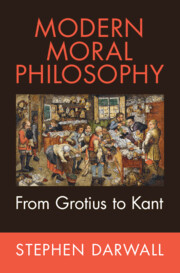Book contents
- Modern Moral Philosophy
- Modern Moral Philosophy
- Copyright page
- Dedication
- Contents
- Preface
- Acknowledgments
- Introduction
- 1 Grotius
- 2 Hobbes and Pufendorf
- 3 Locke and Cumberland
- 4 Spinoza, Cudworth, Shaftesbury, and Leibniz
- 5 Hutcheson and Butler
- 6 Hume and Smith
- 7 The British Rationalists and Reid
- 8 Rousseau and Kant
- Works Cited
- Index
4 - Spinoza, Cudworth, Shaftesbury, and Leibniz
Published online by Cambridge University Press: 10 June 2023
- Modern Moral Philosophy
- Modern Moral Philosophy
- Copyright page
- Dedication
- Contents
- Preface
- Acknowledgments
- Introduction
- 1 Grotius
- 2 Hobbes and Pufendorf
- 3 Locke and Cumberland
- 4 Spinoza, Cudworth, Shaftesbury, and Leibniz
- 5 Hutcheson and Butler
- 6 Hume and Smith
- 7 The British Rationalists and Reid
- 8 Rousseau and Kant
- Works Cited
- Index
Summary
In this chapter, we consider a group of philosophers who formed their views in opposition to voluntarist natural law. Although there are important differences between Spinoza, Cudworth, Shaftesbury, and Leibniz, all four were united by their opposition to voluntarism. For voluntarists, even natural law is a kind of positive law since it is created by God’s discretionary imposition. Against this, Cudworth complained that voluntarism makes morality “positive, arbitrary and factitious only” and unable to explain morality’s “eternal and immutable” character. Leibniz was also a critic of positivist law, and he subversively reinterprets law in terms of love. Justice, he says, is the “charity of the wise.” For his part, Spinoza opposes not just positivist law but law itself. Indeed, although his great metaphysical work is titled Ethics, it constitutes nothing less than a metaphysical reduction of ethical or normative categories. At the same time, he develops a deeply attractive account of human freedom that inspired thinkers to come (including Nietzsche). Shaftesbury draws mostly from Cudworth, but in a way that gives rise to the moral sense tradition of Hutcheson, Hume, and Smith.
- Type
- Chapter
- Information
- Modern Moral PhilosophyFrom Grotius to Kant, pp. 111 - 164Publisher: Cambridge University PressPrint publication year: 2023



